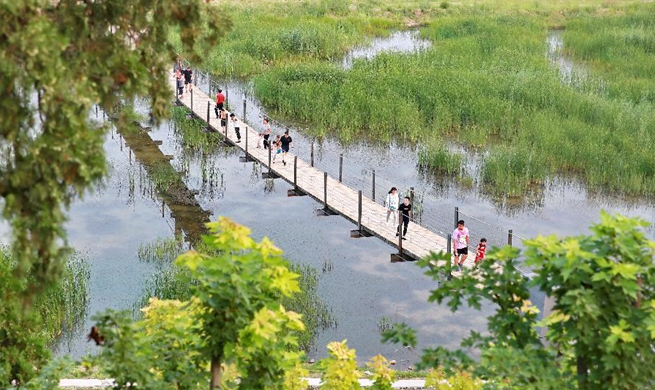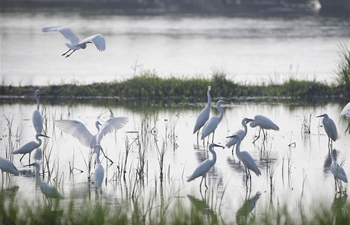LONDON, July 31 (Xinhua) -- England's largest seabird colony is to be extended by 7,600 hectares to provide greater protection for species such as puffins, Environment Minister Therese Coffey said Tuesday.
Her announcement, in National Marine Week, covers the Flamborough Head and Filey Coast Special Protection Area (SPA) of the coast of Yorkshire in northern England.
The SPA already provides a safe haven for breeding seabirds including gannets, razorbills and the iconic puffin. It will mean a quarter of a million breeding seabirds, including almost 2,000 puffins, will be better protected and given a safe space for feeding and foraging.
National Marine Week celebrates Britain's rich marine life and habitats, and ongoing efforts to protect them for future generations.
Natural England has also launched a consultation to extend the nearby Teesmouth and Cleveland Coast SPA by nearly 10,000 hectares, which if designated, will help protect populations of breeding little terns and common terns.
Coffey said: "We are a world-leader in protecting our marine environment, with a third of our waters already protected as part of our Blue Belt."
Brad Tooze, Natural England's area manager for Northumbria, said: "Extending marine protection areas allows for much loved seabirds to feed and breed in a safe haven, ensuring they can thrive for generations to come in a safe and secure habitat."
Special Protection Areas are sites designated to protect populations of rare and vulnerable seabirds from human activity, including fishing or outdoor recreation, while minimising disturbance to birds' open water feeding areas. There are already 45 such sites designated in English waters.
Currently more than a third of English waters are part of a Marine Protected Areas network covering over 200,000 square km, aimed at conserving rare, threatened and nationally important habitats.
A recent government consultation on designating 41 new Marine Conservation Zones received 44,000 responses.
Proposed new sites will cover an area almost eight times the size of Greater London and help protect species like the short snouted seahorse, stalked jellyfish and peacock's tail seaweed. If designated, they will mark the most significant ever expansion of Britain's "Blue Belt" protected areas.













